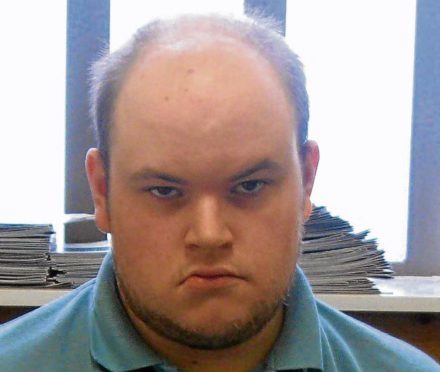A north-east neo-Nazi who is serving a life sentence for plotting terrorism attacks on Scottish mosques has failed in a bid to have his conviction quashed.
Appeal judges Lady Dorrian, Lord Turnbull and Lord Glennie ruled on Thursday that Connor Ward was not the victim of a miscarriage of justice.
Ward, of Banff in Aberdeenshire, was given a life sentence by judge Lord Burns following a hearing at the High Court in Glasgow in April 2018 and told he must serve at least six years before being eligible for parole.
The 25-year-old had previously sparked a bomb scare after threatening to blow himself and his father up and had pledged to usher in the “demise” of Islam.
He denied breaching the Terrorism Act, but was found guilty following a trial at the High Court in Edinburgh in March.
During the trial, a jury heard Ward had acquired components that could have been used to create bombs and kept a list of the addresses of Islamic places of worship.
Police who searched his home found hundreds of ball bearings, which could be used in pipe bombs, and rocket tubes capable of firing improvised explosive devices.
Detectives also discovered an arms cache containing knuckle dusters, knives and deactivated bullets, together with books about far right wing politics.
>> Keep up to date with the latest news with The P&J newsletter
Following his conviction, however, his lawyers went to the Court of Criminal Appeal in Edinburgh to argue that their client had suffered a miscarriage of justice.
They argued that jurors heard evidence which a judge had earlier agreed shouldn’t be placed before them and which was prejudicial to their case.
During his trial, judge Lord Burns directed the jury that they should disregard the evidence, but on Thursday defence advocate Drew McKenzie argued the judge’s direction wasn’t enough to have removed the prejudice.
The appeal judges, however, disagreed and Lady Dorrian told Mr McKenzie and his client: “The appeal must fall.”
During evidence at his trial earlier this year, Ward told jurors that he was “anti-Jewish” and thought that Hitler had made “mistakes”.
He claimed to have bought the metal balls on Amazon so he could hunt rabbits, only to have that claim dismissed by judge Lord Burns after a jury delivered its verdict.
The judge said Ward had “formed an intention” to use the bearings to attack mosques.
He told him: “You had chosen a method of inflicting damage to that target and anyone in it, as demonstrated by the purchase of ball bearings and tubes to put them in.
“You had explored means by which you might disguise yourself in order to perpetrate this act and avoid detection.”
Lord Burns added it was clear Ward was “deeply committed” to neo-Nazi ideology and that if his threats were carried out it would have had “catastrophic results”.
He said: “This involved a high level of research and planning as shown by the vast collection of manuals for the manufacture of IEDs at home.”
